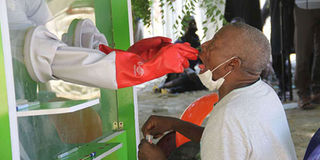Nigerian extends easing of virus lockdown by 2 weeks

A patient undergoes Covid-19 testing at Nigeria’s University of Maiduguri Teaching Hospital isolation centre on May 10, 2020. The Nigerian government on Maya 18, 2020 extended the gradual easing of the lockdown by two weeks as a measure to curb the spread of the Covid-19 pandemic in the country. PHOTO | AUDU MARTE | AFP
What you need to know:
- On April 27, President Buhari approved a phased and gradual easing of lockdown.
- The total number of Covid-19 cases in the most populous African country stood at 5,959 Monday.
ABUJA
The Nigerian government on Monday extended the gradual easing of the lockdown by two weeks as a measure to curb the spread of the Covid-19 pandemic in the country.
According to Boss Mustapha, secretary to the Nigerian government, in spite of the modest progress made, Nigeria is still not ready for a full reopening of its economy.
"The measures, exemptions, advisories, and scope of entities allowed to reopen under phase one of the eased locked down, shall be maintained across the federation for another two weeks effective from midnight (May 18 to June 1)," Mustapha told the media in Abuja.
He said the government's focus by its latest decision is to intensify efforts to tell, trace, and treat cases, as well as elevate the level of community ownership of "non-pharmaceutical interventions".
PHASED REOPENING
On April 27, Nigerian President Muhammadu Buhari approved a phased and gradual easing of lockdown measures in the capital city of Abuja, Lagos, the commercial hub, and Ogun in the southwest region from May 4, as the country continued to navigate the challenges of the Covid-19 pandemic.
But Mustapha, who heads the Presidential Task Force on Covid-19 in the country, said that they continue to assess the level of compliance with the guidelines it gave on easing the lockdown, hence the reason for its extension at the initial stage.
The government aims for a situation whereby the measures put in place would yield sufficient progress, Mustapha said. This, he said, further requires consolidation to ensure that the health system and economy are in a position to adequately respond to any potential outcomes in the future, including a secondary outbreak.
ACCESS TO MARKETS
Mustapha said the gradual reopening of the economy in the past two weeks has been sign-posted by the controlled opening and increased access to markets and supermarkets, banks, and other income-yielding activities for the vulnerable population.
Similarly, corporations and government offices partially opened their operations and services so as to facilitate the activities of other sectors during the period. Some manufacturing, construction, and allied sectors also resumed.
"All these sectors ensured that adequate infection mitigation measures were put in place," Mustapha said.
CASES
The total number of Covid-19 cases in the most populous African country stood at 5,959, and 182 deaths as of Monday, according to the Nigeria Centre for Disease Control. A total of 1,594 cases had recovered.
Despite these figures, Mustapha said the transmission of the virus has been consistently under control and the measures put in place have collectively slowed down the transmission of the virus in Nigeria.
"The healthcare system has been better equipped to detect, test, isolate and treat every case, and trace every person who came into contact with a positive case with the increase in the number of laboratories from 15 to 26; ramping up of testing to a cumulative total of 35,098," he added.





